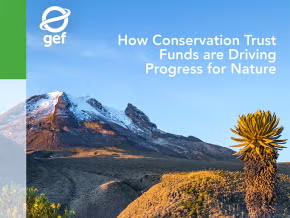Eight governments have pledged an additional $163 million to the Global Biodiversity Framework Fund GBFF in a significant boost for nature conservation.
This funding aims to support countries and communities dedicated to conserving, restoring, and ensuring the long-term health of wildlife and ecosystems.
The new commitments were announced at the ongoing COP16, in Cali by Austria, Denmark, France, Germany, New Zealand, Norway, the United Kingdom, and Québec.
These pledges are intended to further the implementation of the Kunming-Montreal Global Biodiversity Framework.
Among those present were early contributors to the fund, including representatives from Canada, Japan, Luxembourg, and Spain, as well as recipient nations such as Brazil, Gabon, Mexico, and Fiji.
Representatives of Indigenous Peoples and local communities, major philanthropies, and implementing partners like the World Bank were also in attendance.
The Executive Secretary of the Convention on Biological Diversity, Astrid Schomaker, expressed gratitude to donors, emphasizing the importance of the fund’s capitalization for timely support of biodiversity efforts. “This is about money and morale, a message of hope and global solidarity,” Schomaker stated.
Colombia’s Environment Minister and COP16 President, Susana Muhamad, highlighted the significance of these contributions, underscoring the shared objective of implementing the Global Biodiversity Framework. “We all should consider ourselves partners with a common objective,” she said.
Established at the request of COP15, the GBFF was officially launched during the Seventh GEF Assembly in August 2023, with a mission to streamline funding processes for developing countries.
The fund has received contributions from diverse sources, including public, private, and philanthropic entities.
GEF CEO and Chairperson Carlos Manuel Rodríguez noted the fund’s rapid operational progress, remarking on its efficiency and readiness for scaling up support.
“The growing number of governments contributing to the GBFF is a sign of its momentum,” Rodríguez noted, adding that the fund’s operations prioritize efficiency, cost-effectiveness, and safeguards to maintain trust and quality.
The new funding announcement in Cali also marked a milestone with Québec becoming the first subnational government to contribute to the GBFF. Martine Biron, Minister of International Relations and la Francophonie for Québec, highlighted the region’s commitment to climate and biodiversity.
“Québec is a longstanding contributor in climate cooperation, and we hope that this pledge will inspire other stakeholders to help everyone, especially vulnerable countries, to reach our common goal to live in harmony with nature,” she stated.
Earlier in June 2024, the GBFF Council approved its first work program, funding four projects in Brazil, Gabon, and Mexico, along with 18 additional project preparation grants.
Currently, 24 developing countries, including 13 Least Developed Countries and Small Island Developing States, are accessing GBFF support, which includes aid for biodiversity management, policy, governance, and private-sector finance mobilization.
The GBFF aims to have 20 percent of its funding directed towards initiatives led by Indigenous Peoples and local communities, strengthening biodiversity preservation efforts while promoting a sustainable approach to conservation.
By Dare Akogun





